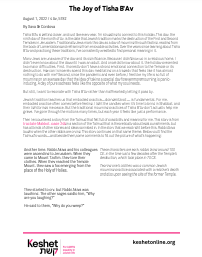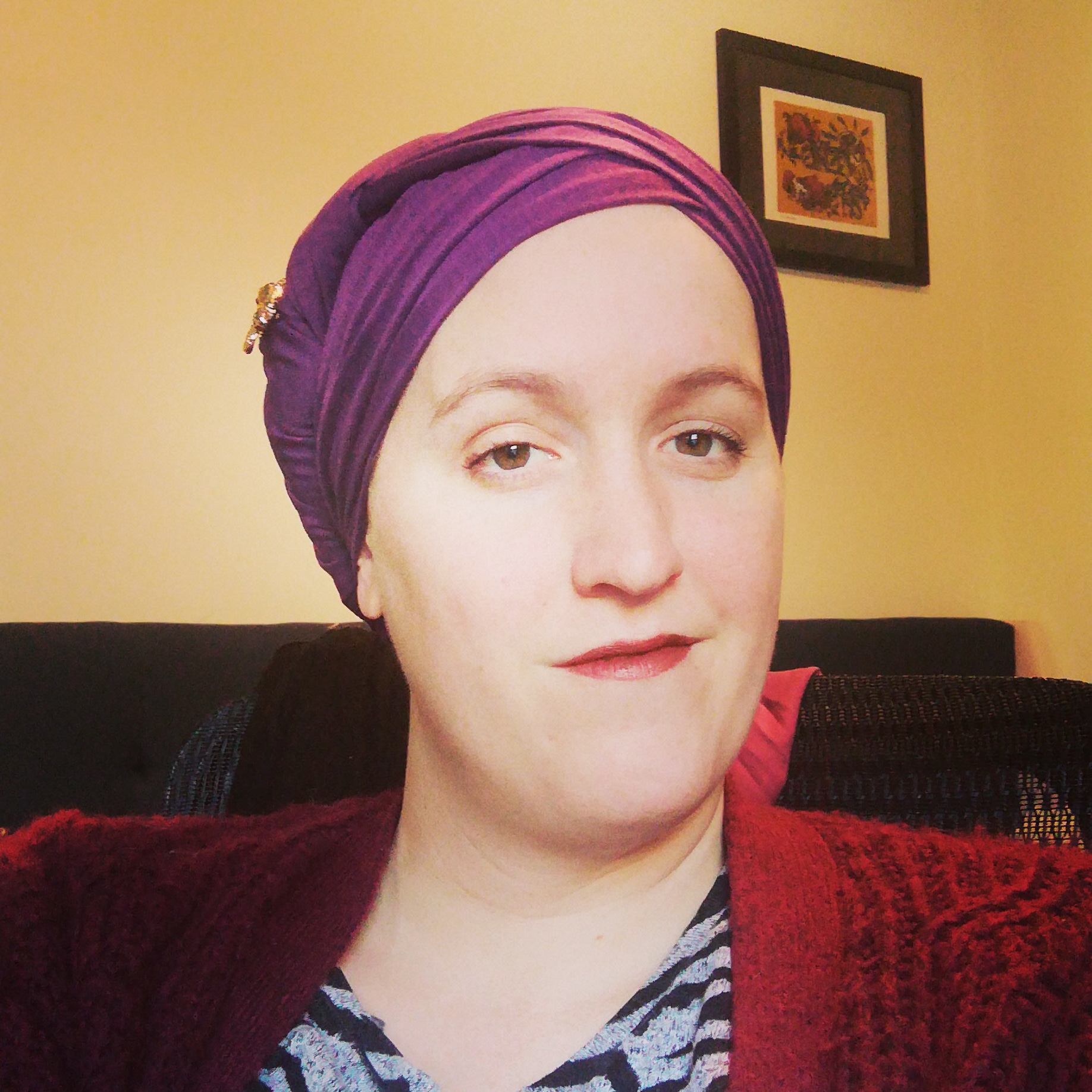
Xava de Cordova on Tisha B'Av and the myriad faces of tragedy: grief, brokenness, laughter, and transformation.
By Xava de Cordova
Download this resource as a PDF.

Tisha B’Av is getting closer, and just like every year, I’m struggling to connect to this holiday. This day, the ninth day of the month of Av, is the date that Jewish tradition marks the destruction of the First and Second Temples in Jerusalem. Traditionally, Jews mark this day as a day of mourning through fasting, reading from the book of Lamentations, and refraining from enjoyable activities. Over the years since learning about Tisha B’Av and practicing these traditions, I’ve consistently wrestled to find personal meaning in it.
Many Jews are unaware of the day and its significance. Because I didn’t grow up in a religious home, I didn’t even know about the day until I was an adult. And once I did know about it, the holiday presented two major difficulties. First, I honestly don’t have a strong emotional connection to the Temple or its destruction. How can I sincerely spend this day meditating on a tragedy that feels like it has almost nothing to do with me? Second, since the pandemic and even before, I feel like my life is so full of mourning on an average day that the idea of taking a special day for even more mourning is panic-inducing. A day of pure sadness feels like the opposite of what my soul needs.
But still, I want to resonate with Tisha B’Av rather than halfheartedly letting it pass by.
Jewish tradition teaches us that embodied practice — doing mitzvot — is fundamental. For me, embodied practice often comes before feeling. I light the candles when it’s time to bring in Shabbat, and their light brings me peace. But the traditional mourning practices of Tisha B’Av don’t actually help me grieve. I’ve gone through the motions many times, but each year it feels like just a performance.
Then I encountered a story from the Talmud that felt full of possibility and meaning for me. This story is from tractate Makkot, page 24b, in a section of the Talmud that is theoretically about legal punishments, but has all kinds of other stories and ideas sprinkled in. In the story that we read right before this, Rabbi Akiva laughs when the other rabbis are crying. This story continues on that same theme. Below you’ll find the Talmud’s words — and beside them, some comments to fill out the picture of what’s happening:
Another time, Rabbi Akiva and his colleagues were ascending to Jerusalem. When they came to Mount Tzofim, they tore their clothes. When they reached the Temple Mount, they saw a fox emerging from the place of the Holy of Holies.
They started to cry, but Rabbi Akiva was laughing. The other sages said to him, “Why are you laughing?”
He said to them, “Why do you weep?”
They replied: “The place about which was written “And the non-priest that draws near shall be put to death”, is now a den of foxes and we should not weep!?”
He replied: “That is why I laugh…It is written in Uriah, ‘Therefore shall Zion for your sake be plowed down…’. In Zechariah it is written ‘Old men and old women shall yet sit in the broad places of Jerusalem.’ Until the prophecy of Uriah was fulfilled, I was afraid that the prophecy of Zechariah would likewise be unfulfilled. Now that the prophecy of Uriah was fulfilled, I know that the prophecy of Zechariah will be fulfilled.”
In this way they answered him: “Akiva, you have consoled us. Akiva, you have consoled us!
The rabbis are doing what we do on Tisha B’Av: taking a moment to mourn the destruction of the Temple. Until this moment, Akiva doubted that the future held peace and restoration. I feel comforted by Akiva’s doubt, because it teaches me that my own doubts and hopelessness have a place in our tradition. But rather than being consumed by doubt, Rabbi Akiva finds the joy that’s hiding in the moment. His reaction offers an emotional practice that any of us can cultivate and that is especially perfect for Tisha B’Av.
Rabbi Akiva laughs. This might seem like the very opposite of what we ought to be doing in this season! This voice from our tradition reminds us that within the wreckage of our present lies the promise of rebuilding and returning to the most beautiful and just future we can imagine.
As a queer and trans person, I see the joy that’s inside grief when I look back at my closeted years. So much rejection, fear and sadness filled those days. But the present me, who I love so much, wouldn’t be possible without breaking out of the shell of my past self. At the same time I don’t look back with unyielding sadness. I feel grateful to who I was and delighted with who I have become. When I’m at my best, I’m able to appreciate every part of my journey — even the hard parts — and to laugh with delight at all of it.
Maybe Tisha B’Av can be like that too. The beautiful, wonderful Judaism we have today would have been impossible without breaking away from what came before. The destruction of the Temple led to an incredible blossoming of Jewish innovation. As we grieve the destruction of a holy and cherished place, we can also celebrate the power that is born in the times of our collective and personal brokenness.
The other sages weren’t wrong to weep. Sometimes brokenness is just brokenness and not an opportunity to find a novel source of hope. I think it’s significant that Akiva wasn’t laughing in the days immediately after the Temple’s destruction: it was only decades later that he was able to find this perspective. It often takes some of the healing of time to be able to search for that spark of hope. And even more importantly, no one can make the choice for us about whether laughter or tears is right. We should never presume to brush off someone else’s grief or insist on searching for silver linings.
The story is offering us two valid models of handling tragedy. Rabbi Akiva didn’t criticize his friends for crying just because that moment brought him laughter instead. Perhaps more importantly, he waited to let them meet the moment in their own way. Only then, when they asked him about his reaction, he shared his process in a way that supported his companions’ healing.
Each of us has that opportunity in our own lives. In our day to day, we can give conscious attention to any time we smile or laugh. Those little sparks of joy have kept me going through times I wasn’t sure I could survive.
Because the world is full of conflict, because each of us undoubtedly have our own traumas and tragedies, we are in a sense always climbing among the ruins like the Rabbis in our story. We can weep. But we can also laugh when we notice that our trajectory through brokenness might point towards our joyful future. This Tisha B’Av, I hope you’ll join me in the ruins. Whether we cry or laugh, may we find our responses affirmed and honored. May we all get to be exactly where we are in the journey through the ruins, and may we too find the prophetic capacity to imagine in the midst of our brokenness a path to hope, restoration, and possibility. may we all move towards rebuilding and restoring ourselves and our communities.
 Xava De Cordova is a disabled, Sefradi, Mizraxi trans woman and co-host of the world’s first Queer Talmud podcast, “Xai, how are you?”. She is a long-time SVARA-style Talmud learner and SVARA teaching kollel fellow who got her start as a teacher by creating Beit Midrash Behind Bars, an organization that facilitated Jewish learning opportunities for incarcerated people in Washington State. She is also the co-founder of Shel Maala, an online-first queer yeshiva , which she co-founded along with SVARA fellow with Binya Koatz. She lives in Providence, RI, where she regularly produces Jewish ritual theater (or did, before the pandemic) , studies for private ordination, and does her best to steward the radical tradition she’s been blessed to inherit.
Xava De Cordova is a disabled, Sefradi, Mizraxi trans woman and co-host of the world’s first Queer Talmud podcast, “Xai, how are you?”. She is a long-time SVARA-style Talmud learner and SVARA teaching kollel fellow who got her start as a teacher by creating Beit Midrash Behind Bars, an organization that facilitated Jewish learning opportunities for incarcerated people in Washington State. She is also the co-founder of Shel Maala, an online-first queer yeshiva , which she co-founded along with SVARA fellow with Binya Koatz. She lives in Providence, RI, where she regularly produces Jewish ritual theater (or did, before the pandemic) , studies for private ordination, and does her best to steward the radical tradition she’s been blessed to inherit.